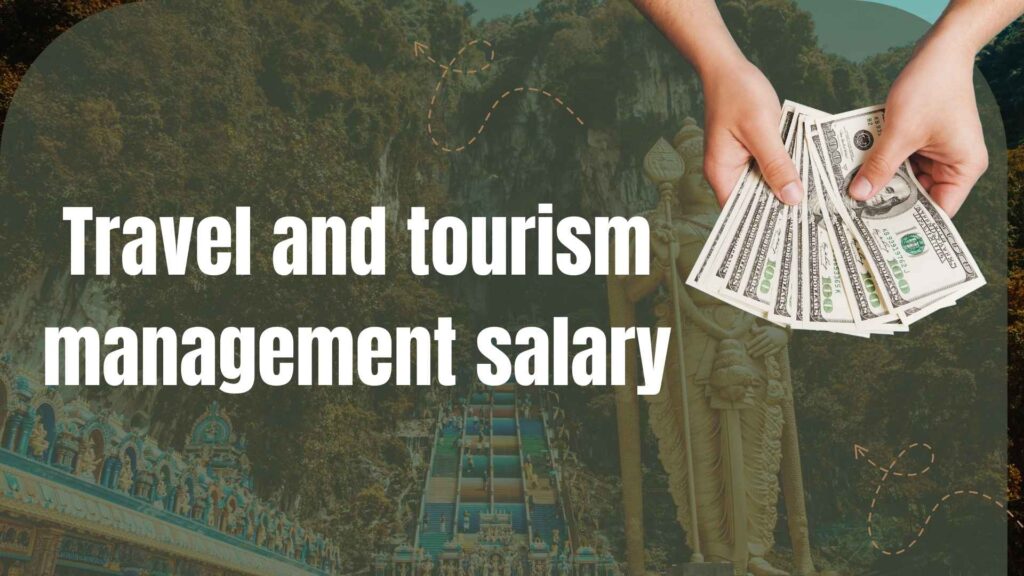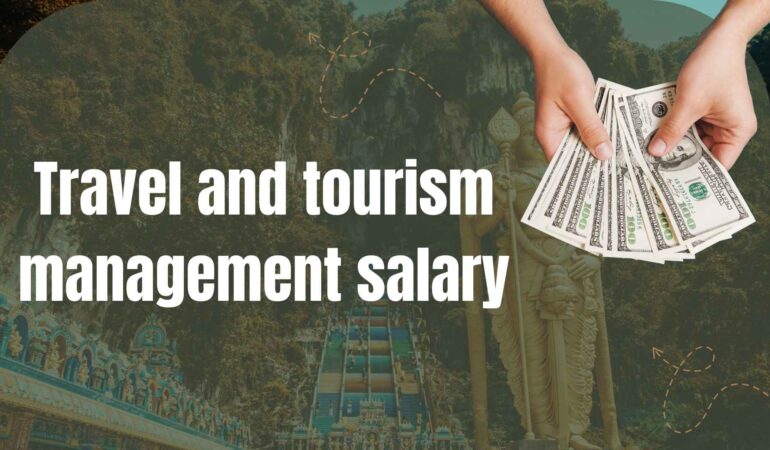Travel and tourism management salary

Travel and tourism management salary
Let’s face it—when you’re picking a career, the paycheck matters. If you’re curious about travel and tourism management salary, you’re in the right place. Whether you’re dreaming of managing a luxury resort in Bali or coordinating tours in Paris, we’re diving deep into the numbers, roles, and growth potential in this buzzing industry.
Introduction to Travel and Tourism Management
Travel and tourism management is all about creating unforgettable experiences. From planning dream vacations to managing resorts or cruise ships, this field is vibrant, diverse, and full of opportunities.
Why Salaries in Travel and Tourism Management Matter
With globalization and increased travel demand, the tourism sector is booming. But how does that translate into your bank account? Let’s break it down so you know what to expect.
Core Roles in Travel and Tourism
Travel Agent
Average salary: $35,000–$50,000
They plan itineraries, book flights, and ensure clients have hassle-free vacations.
Tour Manager
Average salary: $40,000–$60,000
They guide tour groups, manage schedules, and solve problems on the go.
Destination Manager
Average salary: $60,000–$85,000
They oversee the development and marketing of tourism destinations.
Hotel and Resort Manager
Average salary: $50,000–$120,000
Responsible for guest satisfaction, budgeting, and operations.
Event Coordinator
Average salary: $45,000–$65,000
Specializes in organizing conferences, weddings, and travel-related events.
Cruise Director
Average salary: $55,000–$90,000
They manage onboard entertainment and guest experiences.
Salary Expectations by Job Title
Entry-Level Positions
Expect between $30,000 to $45,000. Think travel agents or junior coordinators.
Mid-Level Management
$50,000 to $80,000 for roles like marketing managers or operations leads.
Senior Executive Roles
Upwards of $100,000. These include directors or CEOs in major tourism firms.
Factors That Influence Salary in Tourism Management
Location and Cost of Living
Working in Dubai or New York? Expect higher salaries due to living costs.
Experience and Skillset
The more seasoned and specialized you are, the better your earnings.
Education and Certification
Degrees in hospitality or tourism management and certifications like IATA or CMP can significantly bump your pay.
Industry Sector (Private vs. Government)
Private-sector jobs tend to pay more but may come with higher stress.
Salary Comparison by Country
United States
Average: $58,000
High-paying cities: NYC, LA, Miami
United Kingdom
Average: £30,000–£55,000
Tourism hubs like London offer top salaries.
Australia
Average: AUD 65,000
High demand in Sydney and Melbourne.
Canada
Average: CAD 55,000
Opportunities are strong in Toronto and Vancouver.
India
Average: ₹300,000–₹800,000
Metro cities offer the best packages.
How to Boost Your Salary in Tourism Management of travel and tourism management salary
Certifications That Add Value
Get certified in project management, event planning, or specific tourism tools.
Networking and Industry Events
Meet people, exchange ideas, and maybe land a better job.
Advanced Education (MBA, etc.)
A higher degree often means a higher paycheck.
Switching to High-Paying Sectors
Luxury tourism or MICE (Meetings, Incentives, Conferences, and Exhibitions) pays more.
Real Stories from the Industry
From Travel Agent to CEO
Many execs started small—what matters is how you grow.
How One Tour Guide Built a 6-Figure Career
Niche expertise and digital marketing turned a guide into a brand.
.
Freelancing and Consulting in Tourism travel and tourism management salary
Average Pay for Freelancers
Anywhere from $20 to $100/hour depending on niche and experience.
Building a Brand as a Consultant
With the right positioning, consultants can make six figures.
Is Travel and Tourism Management Worth It Financially?
.Yes—if you’re passionate and strategic. It’s a field where love for travel meets solid career potential. With experience and smart choices, you can earn very well.
Key Job Roles in Travel and Tourism
Travel Consultant
Average Salary: $35,000–$55,000
These professionals help clients plan trips, book accommodations, and provide travel advice.
Tour Manager
Average Salary: $40,000–$65,000
Responsible for managing tours, itineraries, and customer experiences during group trips.
Hotel Manager
Average Salary: $50,000–$120,000
Oversees the entire operation of a hotel, from guest services to financial planning.
Destination Marketing Manager
Average Salary: $60,000–$95,000
Works with tourism boards to promote travel to specific regions or countries.
Event and MICE Manager
Average Salary: $60,000–$100,000
Plans corporate events, conferences, and incentive trips—a lucrative part of tourism.
Cruise Director
Average Salary: $55,000–$90,000
Coordinates entertainment and activities onboard cruise ships.
Average Salary by Position
Entry-Level
Typical roles: Assistant Tour Manager, Junior Travel Agent
Salary range: $30,000–$45,000
Fresh graduates or those transitioning into tourism often start here.
Mid-Level
Typical roles: Operations Manager, Hotel Supervisor
Salary range: $50,000–$75,000
With 3–7 years of experience, you’ll likely move into managerial roles with higher pay.
Executive and Senior-Level
Typical roles: Director of Operations, CEO of a Travel Firm
Salary range: $90,000–$150,000+
At this level, you’re shaping the company’s vision and strategies.
Career Pathways and Growth Opportunities
Start as a travel agent, move to operations, and climb up to director-level roles. Some professionals even start their own agencies or consult for international tourism boards.
Top Certifications to Boost Your Salary
IATA Travel & Tourism Certification
Certified Travel Associate (CTA)
CMP (Certified Meeting Professional)
Hospitality Management Certificates (Cornell, Harvard, etc.)
Digital Skills in Tourism That Pay Off
Knowing how to use GDS systems (Amadeus, Sabre), CRMs, social media marketing, or even travel blogging tools like SEO and WordPress can make you more employable—and better paid.
Is a Career in Travel and Tourism Management Worth It?
Absolutely—if you do it right. Start small, gain experience, pick a profitable niche, and never stop learning. This isn’t just a job; it’s a career that can take you around the world—literally and financially.

